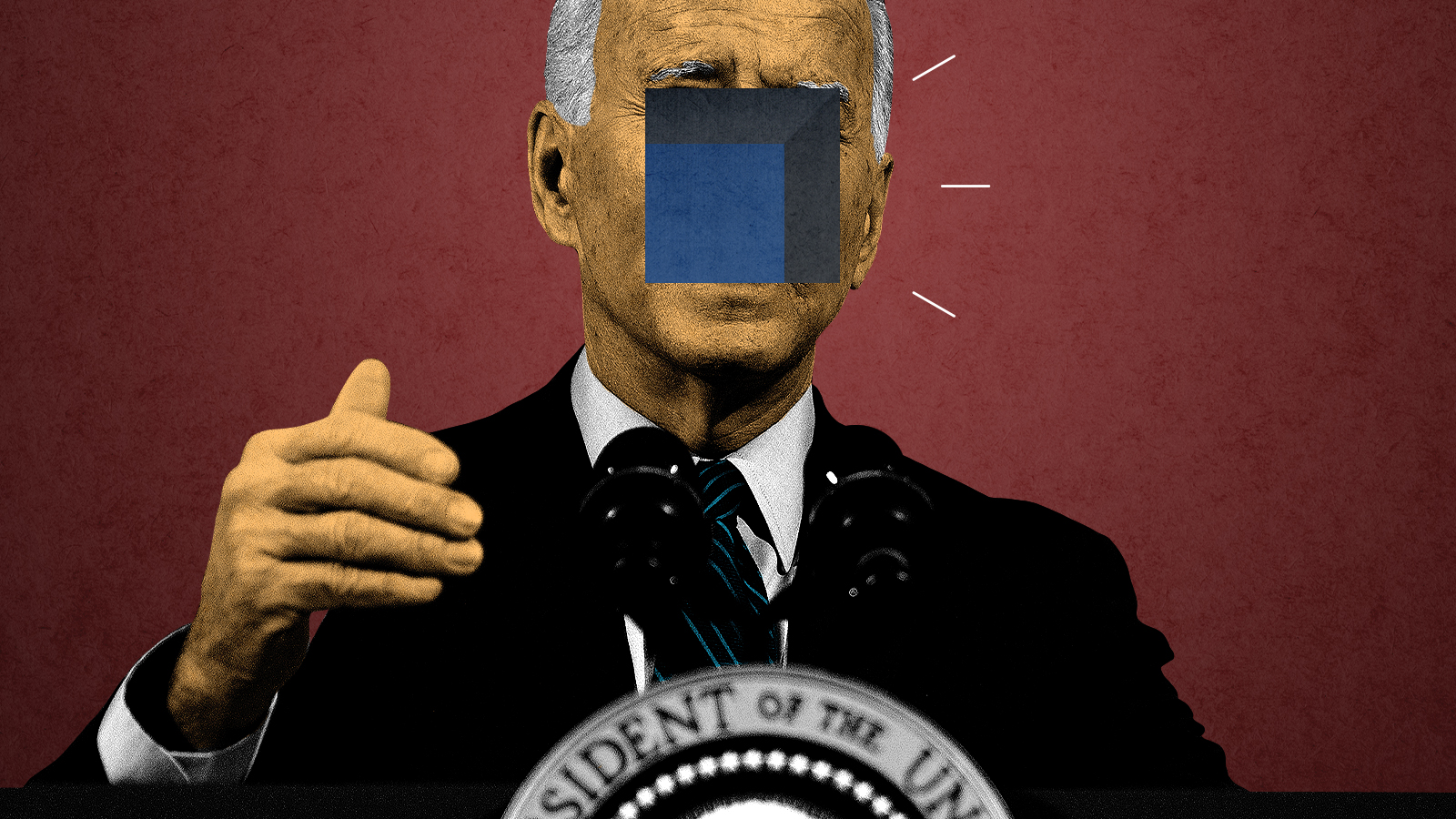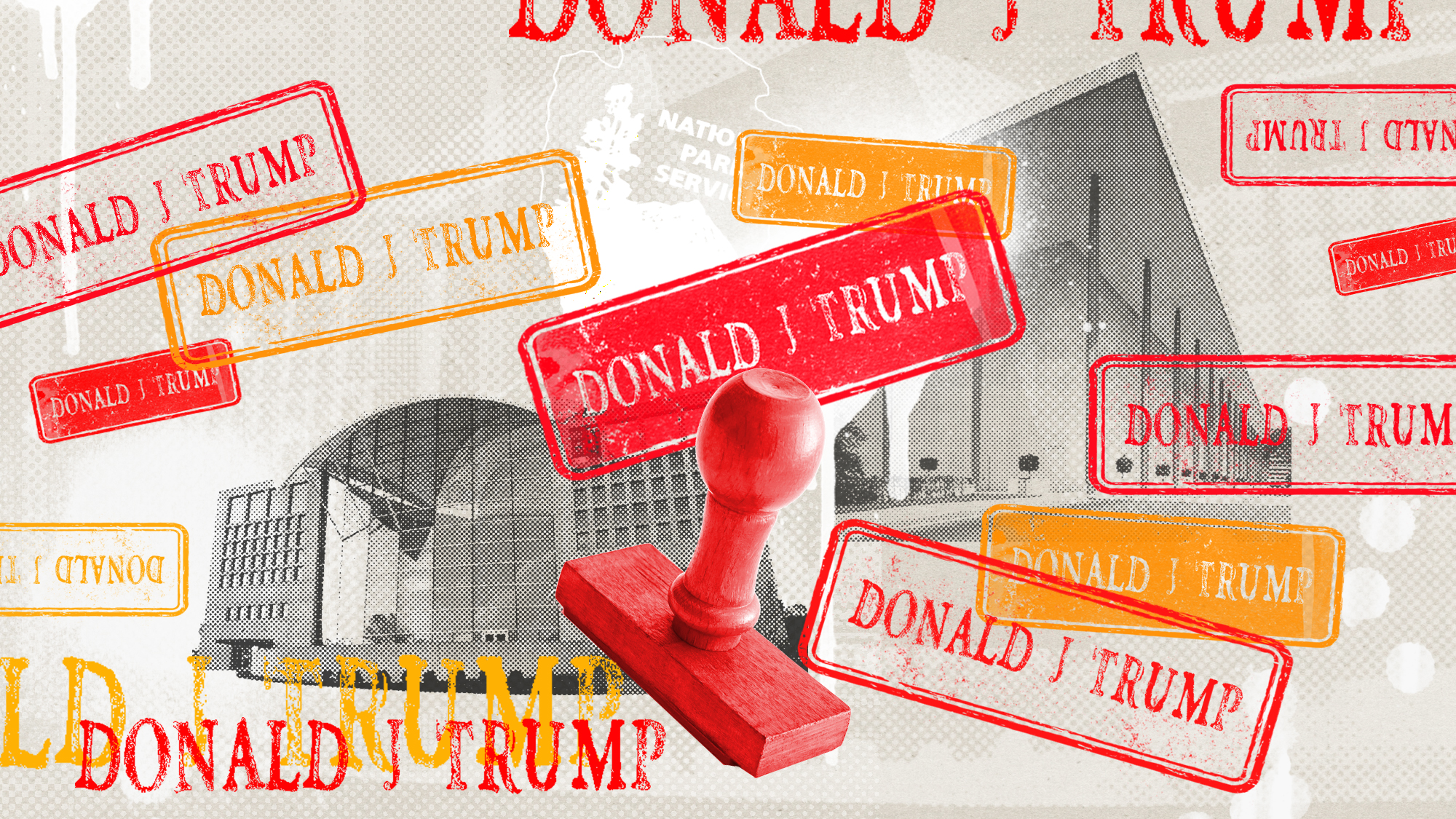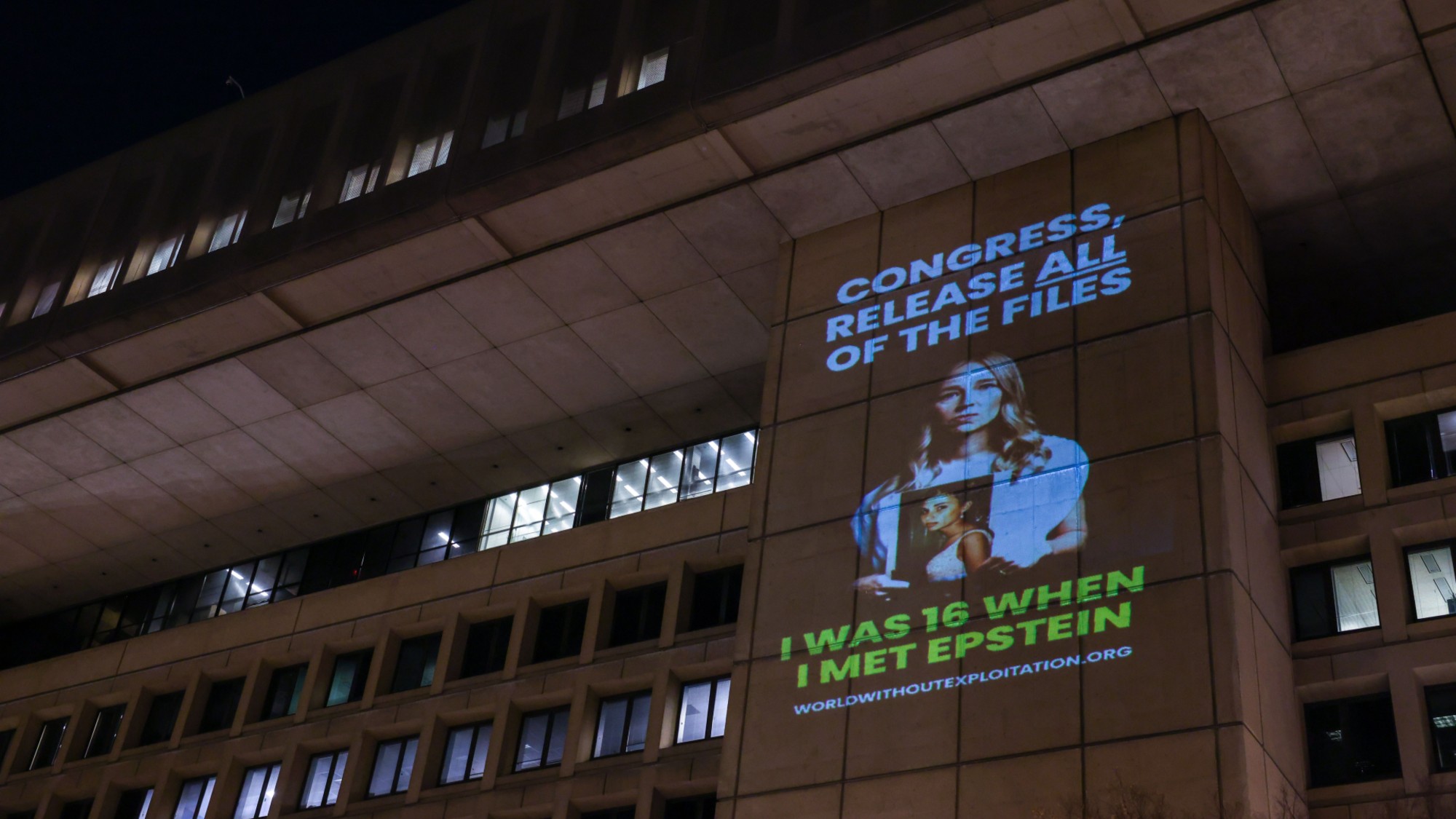Which Democrats could run against Joe Biden in 2024?
It's a long year until the party formally crowns a nominee

A free daily email with the biggest news stories of the day – and the best features from TheWeek.com
You are now subscribed
Your newsletter sign-up was successful
Ready or not, President Biden is running for re-election in 2024. He launched his campaign for a second term on April 25, exactly four years after he launched his successful 2020 bid. Not all Democrats are excited about his re-election campaign, but he's expected to handily win their 2024 nomination.
Last summer, the 80-year-old president rejected the idea that a large majority of his own party's voters don't want him on the ballot in 2024, after a reporter cited poll numbers suggesting just 26% of Democrats wanted him to be the nominee. "Read the polls, Jack!" Biden said. "You guys are all the same. That poll showed that 92% of Democrats, if I ran, would vote for me." This statement, however, was somewhat misleading: 92% of Democrats said they would vote for Biden in a general election rematch with former President Donald Trump, not in a Democratic primary.
Who has officially declared?
Besides Biden, so far only two people have officially declared their candidacy for the Democratic nomination.
The Week
Escape your echo chamber. Get the facts behind the news, plus analysis from multiple perspectives.

Sign up for The Week's Free Newsletters
From our morning news briefing to a weekly Good News Newsletter, get the best of The Week delivered directly to your inbox.
From our morning news briefing to a weekly Good News Newsletter, get the best of The Week delivered directly to your inbox.
Marianne Williamson: Author and "self-help guru" Marianne Williamson launched her campaign for the Democratic presidential nomination in March, becoming the first candidate to officially do so. At her launch event, speaking in what The Associated Press called a "defiant tone," Williamson criticized "those who feel they are the adults in the room" and not taking her candidacy seriously. "Let me in there," she said. Williamson also ran in 2020 but eventually dropped out.
In a Morning Consult survey, 4% of potential Democratic primary voters said they would back Williamson if the party's 2024 primaries were held today, while an overwhelming 77% of those same voters said they would instead opt for Biden. Morning Consult surveyed 2,003 registered voters from March 3-5. Results have a margin of error of +/- 2 percentage points.
Robert F. Kennedy Jr.: In early April, Robert F. Kennedy Jr., an environmental lawyer, known vaccine opponent, and the son of assassinated U.S. Sen. Robert F. Kennedy, filed paperwork with the Federal Election Commission to enter the 2024 race as a Democrat. He officially launched his campaign on April 19 in Boston. No famous relatives or leading Massachusetts Democrats attended the rally to launch Kennedy's "all-but-doomed bid," Politico reported. "With the absence of Kennedys — and Democrats — Kennedy surrounded himself on Wednesday with an eclectic mix of vaccine skeptics, independent voters, and conservatives, several of whom had flown in from across the country."
Kennedy's poll numbers were unexpectedly strong soon after he entered the race, but they have dropped among Democrats — and his favorability numbers have tanked — as he ensnared himself in controversies, more Democrats learned about his beliefs, and far-right Republicans invited him to testify before Congress.
A free daily email with the biggest news stories of the day – and the best features from TheWeek.com
Long-shot contenders
No sitting president in modern American history has been successfully primaried, though intraparty challenges usually end up hurting the incumbent in the general election. If something happens to change Biden's mind or circumstances in the long months before the 2024 Democratic National Convention in Chicago, however, "then it's open season," Tampa-area Democrat Doris Carroll told The Wall Street Journal.
Kamala Harris: Generally speaking, a vice president who wants to be the nominee gets to be the nominee. Think Hubert Humphrey, Al Gore, or George H.W. Bush. In this case, however, Vice President Kamala Harris looks particularly vulnerable. The Journal notes that her approval ratings are even worse than Biden's, the Journal noted, while The Washington Post reported that she has struggled to "differentiate herself" from the unpopular president under whom she serves — though that could change.
Despite her persistently low approval rate, Harris is still Democrats' No. 1 choice for president after Biden. A Harvard Center for American Progress and Harris Insights and Analytics (Harvard CAPS/Harris) poll in March found the vice president at the top of the list of potential options should Biden choose not to run, with 22% of Democratic voters choosing her as their alternate candidate. Of the 40% of Democratic voters who said they think Biden would lose the primary if he opts to run, 9% said they thought Harris would win. Harvard CAPS/Harris surveyed 2,905 registered voters between March 22-23, 2023.
Dean Phillips: Rep. Dean Phillips (D-Minn.) is the only elected Democratic lawmaker actively considering a challenge to Biden, and one of the few who has "publicly expressed concerns about Biden running for a second four-year term in the White House as an octogenarian," USA Today reported. And unlike RFK Jr. and Marianne Williamson, Phillips, 54, "has close ties with Democratic congressional leadership."
A former executive, Phillips is "the sort of pro-business social moderate with private sector experience who corporate leaders usually pine for in a presidential candidate," Jonathan Martin wrote at Politico. He is "highly unlikely to mount a primary challenge unless Biden's health worsens or his political standing drops precipitously," but Phillips also "remains convinced" that Democrats need "a robust conversation" about who to nominate in 2024, and he "recognizes that the more obvious would-be challengers" won't jump into the primary "unless somebody else first breaks the political ice."
Michelle Obama: Some politicos have prematurely deemed Michelle Obama as the heir apparent to the Democratic Party. The only problem is that the former first lady says she doesn't want to run. "We just can't find the women we like and ask them to do it, because there are millions of women who are inclined and do have the passion for politics," she said in 2018. "I've never had the passion for politics."
Gretchen Whitmer: Michigan Gov. Gretchen Whitmer (D) does have a passion for politics, and she is "viewed as a rising national star and presidential prospect" after winning a second term "by a commanding margin" in 2022, NBC News reported. Speculation about her future in national politics heightened after she announced a new political action committee, Fight Like Hell PAC, in June, saying in the launch video that the state she helped turn blue is at "a moment where our fight must stretch beyond Michigan and reach the entire country."
Whitmer, 51, is a co-chair of Biden's reelection campaign, and she has said repeatedly she is not running for president in 2024. But "no shortage of Democratic colleagues, operatives and donors has encouraged Whitmer to seek the presidency — and not necessarily to wait until her second term ends" in 2026, Mark Leibovich wrote in The Atlantic. And she "didn't bother with the annoyance that many ambitious pols feel compelled to feign" when pressed on "whether they might give the ol' presidency a look."
Certainly, "Democrats should hope the Michigan governor changes her mind about running in 2024," Amanda Carpenter wrote at The Bulwark. Her denials about running "are, at this point, politically obligatory," but she is "a team player" who is "plausible as a 2024 presidential contender only in the circumstance that would allow any other Democrat on the party's surprisingly deep bench to become competitive for the nod: in the absence of Biden." Given Biden's age, that's not too outlandish a possibility.
Gavin Newsom: California Gov. Gavin Newsom (D) has said he won't challenge Biden. And in May 2022, he told the San Francisco Chronicle he has "sub-zero" interest in running at all.
Despite these comments, Newsom has appeared to position himself to run in an open primary by taking the fight to conservatives. In Texas, he took out full-page ads comparing his own positions on abortion and gun control to those of Texas Gov. Greg Abbott (R). In Florida, he ran a TV spot slamming Gov. Ron DeSantis (R). He even posts videos on former President Donald Trump's Truth Social platform.
Still, in an interview with CBS News in October, Newsom reiterated that he had no intentions of running for president. "It's not my ambition," he insisted. "It's not the direction that I'm leaning into. It's not the moment." When asked if he could say he would never run for president, Newsom replied, "Yeah, I have no interest."
J.B. Pritzker: Billionaire hotel heir and Illinois Gov. J.B. Pritzker also ruled out challenging Biden, but he has been hitting the road and "expanding his national profile" in recent months with trips to Maine, New Hampshire, and Florida, the Journal notes. Pritzker's aides say his out-of-state travels are meant to support Democratic gubernatorial candidates.
Pritzker won his second gubernatorial race last fall, and despite all the buzz about his potential as an alternate candidate, he seems content to support Biden.
Pete Buttigieg: In a ranking of the "most likely Democratic candidates for president in 2024" from The Washington Post's Aaron Blake, Transportation Secretary Pete Buttigieg should come in second only to President Biden, Blake estimated. Mayor of a mid-size city to transportation secretary to president isn't exactly a typical pipeline, but Buttigieg was a strong contender in the 2020 Democratic primaries, winning the most delegates in the Iowa caucus before dropping out and endorsing Biden just before Super Tuesday.
That said, Blake wrote in February, Buttigieg's day job has "turned into a slog thanks to a series of crises," including the train derailment in East Palestine, Ohio. The most recent Harvard/Harris poll also has him placing fifth in a Biden-free primary, with support from just 8% of voters.
Bernie Sanders: He wouldn't exactly solve the "Biden is too old" problem: Sen. Bernie Sanders (I-Vt.) turned three months old the day Franklin Delano Roosevelt condemned Japan's attack on Pearl Harbor — but he's still popular with a big chunk of the Democratic base, and no clear successor has arisen to fill his niche.
In April 2022, Sanders' 2020 campaign released a memo informing his supporters that, "in the event of an open primary," the democratic socialist "has not ruled out another run for president." After Biden launched his re-election bid, Sanders quickly endorsed him and ruled out another run for himself.
Hillary Clinton: Hillary Clinton has strong name recognition, but political consultant Douglas Schoen suggests that she might have more going for her than that. In a July 3, 2022, op-ed for The Hill, Schoen argued that the "perfect storm" of Biden's unpopularity and the lack of "any other rising stars who could ... win in a general election" has left Clinton as Democrats' best chance for 2024. Conservative writer John Ellis also made the case for Clinton, arguing on Substack that the fall of Roe v. Wade (1973) gives Clinton the perfect opportunity "to get out of stealth mode and start down the path toward declaring her candidacy for the 2024 Democratic presidential nomination."
However, Clinton told the Financial Times last summer that a 2024 bid is "out of the question," pointing to her expectation that Biden would run again.
Alexandria Ocasio-Cortez: Rep. Alexandria Ocasio-Cortez (D-N.Y.) is just barely old enough to run in 2024 — she'd turn 35 about three months before Inauguration Day. In June 2022, she dodged a question from Stephen Colbert about whether she was considering a 2024 bid. "We'll cross that bridge when we get to it," AOC told the Late Show host.
The Squad member is a darling to the party's progressive wing, but she's untested outside of deep-blue Brooklyn. Political strategist Dick Morris, who ran Bill Clinton's 1996 campaign before becoming a Republican, claimed in a book that AOC could win the Democratic primary but would "likely lose more than 40 states" in the general election. On the other hand, Morris notoriously predicted that Mitt Romney would win a landslide victory in 2012, so who knows?
Anyone else?
Other names that have been floated include Commerce Secretary Gina Raimondo, Secretary of State John Kerry, Rep. Ro Khanna (Calif.), New Jersey Gov. Phil Murphy, and Sens. Amy Klobuchar (Minn.), Cory Booker (N.J.), Sherrod Brown (Ohio), and Chris Murphy (Conn.). Former Rep. Beto O'Rourke (Texas) and former Georgia state Rep. Stacey Abrams have also received some buzz, though they both lost their respective gubernatorial races.
Updated August 3, 2023: This article has been updated throughout.
Theara Coleman has worked as a staff writer at The Week since September 2022. She frequently writes about technology, education, literature and general news. She was previously a contributing writer and assistant editor at Honeysuckle Magazine, where she covered racial politics and cannabis industry news.
-
 Local elections 2026: where are they and who is expected to win?
Local elections 2026: where are they and who is expected to win?The Explainer Labour is braced for heavy losses and U-turn on postponing some council elections hasn’t helped the party’s prospects
-
 6 of the world’s most accessible destinations
6 of the world’s most accessible destinationsThe Week Recommends Experience all of Berlin, Singapore and Sydney
-
 How the FCC’s ‘equal time’ rule works
How the FCC’s ‘equal time’ rule worksIn the Spotlight The law is at the heart of the Colbert-CBS conflict
-
 A running list of everything Donald Trump’s administration, including the president, has said about his health
A running list of everything Donald Trump’s administration, including the president, has said about his healthIn Depth Some in the White House have claimed Trump has near-superhuman abilities
-
 A running list of everything Trump has named or renamed after himself
A running list of everything Trump has named or renamed after himselfIn Depth The Kennedy Center is the latest thing to be slapped with Trump’s name
-
 A running list of the international figures Donald Trump has pardoned
A running list of the international figures Donald Trump has pardonedin depth The president has grown bolder in flexing executive clemency powers beyond national borders
-
 A running list of US interventions in Latin America and the Caribbean after World War II
A running list of US interventions in Latin America and the Caribbean after World War IIin depth Nicolás Maduro isn’t the first regional leader to be toppled directly or indirectly by the US
-
 The billionaires’ wealth tax: a catastrophe for California?
The billionaires’ wealth tax: a catastrophe for California?Talking Point Peter Thiel and Larry Page preparing to change state residency
-
 A running list of the US government figures Donald Trump has pardoned
A running list of the US government figures Donald Trump has pardonedin depth Clearing the slate for his favorite elected officials
-
 Bari Weiss’ ‘60 Minutes’ scandal is about more than one report
Bari Weiss’ ‘60 Minutes’ scandal is about more than one reportIN THE SPOTLIGHT By blocking an approved segment on a controversial prison holding US deportees in El Salvador, the editor-in-chief of CBS News has become the main story
-
 The powerful names in the Epstein emails
The powerful names in the Epstein emailsIn Depth People from a former Harvard president to a noted linguist were mentioned


